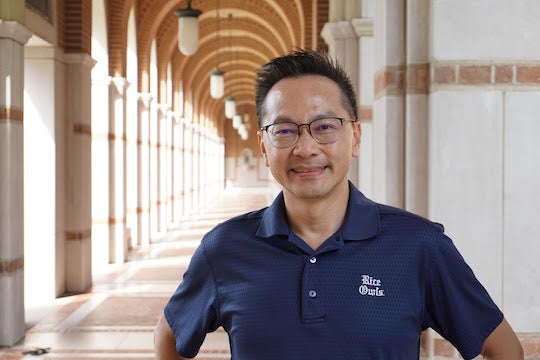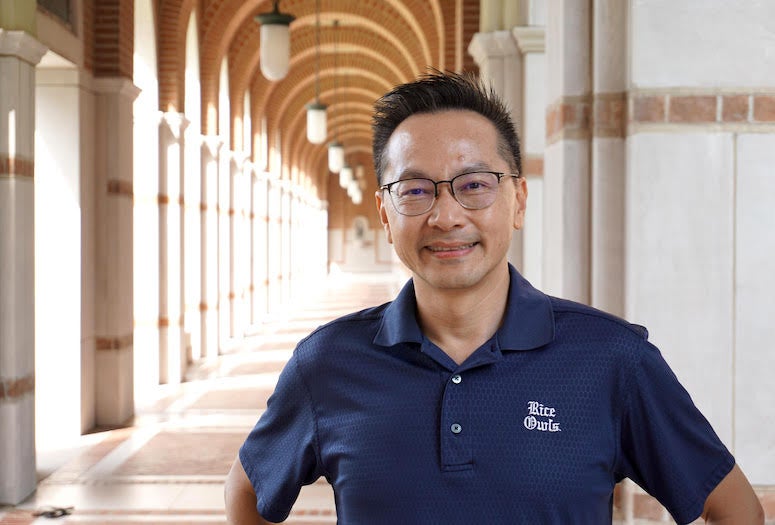Rice University’s Michael Wong was named a fellow to the Royal Society of Chemistry (RSC), the oldest chemical society in the world, whose mission is to “advance excellence in the chemical sciences.” More than 180 years old, the United Kingdom-based chemical society has over 54,000 members worldwide.

“It’s a confirmation that the work we do in our group is something that people appreciate and is making a meaningful contribution to the scientific field,” said Wong, who leads the Catalysis and Nanomaterials lab at Rice. “I was really honored to be nominated and chosen.”
Using materials chemistry and nanotechnology, Wong’s research seeks to address broader, real-world energy and sustainability goals through focused inquiry in water decontamination, nanoparticle synthesis and catalysis.
“I think one of the major areas of interest in the chemical sciences today is sustainability research,” Wong said. “Chemistry and chemical engineering have real tools to offer to tackle this very complex problem, which includes issues like clean water, clean energy, carbon dioxide mitigation, scarce resource-recovery from unconventional sources, etc. So, over the next few decades, I think the type of advances we will see in the chemical sciences and engineering will very much be driven by the need to respond to some of these urgent demands.”
One of Wong’s areas of expertise is water decontamination, which he views as an imperative to improving human health, achieving social equity and establishing emerging clean energy technologies.
“The knowledge we have built over the years generates its own momentum where we now have a track record of specific contaminants we know we can target and remove from water using technologies we’ve developed specifically to this end,” Wong said. “But it's one thing to develop these technologies to clean water, and another thing to deploy them responsibly and in a way that is mindful of the challenges different communities face in real-world contexts. Factors like cost, scale and user friendliness are really important here, just as they are when thinking about the fact that new techniques like water splitting also require clean water to be implemented.”
Whether framed as a problem-solving pursuit or an open-ended quest for knowledge, Wong argues that scientific advance depends first of all on the engagement and preparedness of next generations of scientists.
“It’s important to me that students leave Rice and my group with the ability and confidence to compete with the best, in whatever they decide to pursue,” Wong said.
Wong is the Tina and Sunit Patel Professor in Molecular Nanotechnology, chair and professor of chemical and biomolecular engineering, and a professor of chemistry, materials science and nanotechnology, as well as civil and environmental engineering. Among his other honors, Wong is a fellow of the American Institute of Chemical Engineers and the American Chemical Society.
- Image Downloads:
-
https://news-network.rice.edu/news/files/2023/07/Michael-Wong_LG1.jpg
CAPTION: Michael Wong is the Tina and Sunit Patel Professor in Molecular Nanotechnology, chair and professor of chemical and biomolecular engineering, and a professor of chemistry, materials science and nanotechnology, and civil and environmental engineering at Rice University. (Photo courtesy of Michael Wong/Rice University) - Related stories:
-
Jun Lou elected a fellow of the Royal Society of Chemistry:
https://msne.rice.edu/news/jun-lou-elected-fellow-royal-society-chemistry
Martí named fellow of the Royal Society of Chemistry:
https://news.rice.edu/news/2020/marti-named-fellow-royal-society-chemistry
Halas named a fellow of the Royal Society of Chemistry:
https://sci.rice.edu/news/halas-named-fellow-royal-society-chemistry
- Links:
-
Catalysis and Nanomaterials group: https://www.ruf.rice.edu/~wonglab/index.html
Rice Department of Chemical and Biomolecular Engineering: https://chbe.rice.edu/George R. Brown School of Engineering: https://engineering.rice.edu
- About Rice:
-
Located on a 300-acre forested campus in Houston, Rice University is consistently ranked among the nation’s top 20 universities by U.S. News & World Report. Rice has highly respected schools of Architecture, Business, Continuing Studies, Engineering, Humanities, Music, Natural Sciences and Social Sciences and is home to the Baker Institute for Public Policy. With 4,552 undergraduates and 3,998 graduate students, Rice’s undergraduate student-to-faculty ratio is just under 6-to-1. Its residential college system builds close-knit communities and lifelong friendships, just one reason why Rice is ranked No. 1 for lots of race/class interaction and No. 4 for quality of life by the Princeton Review. Rice is also rated as a best value among private universities by Kiplinger’s Personal Finance.

